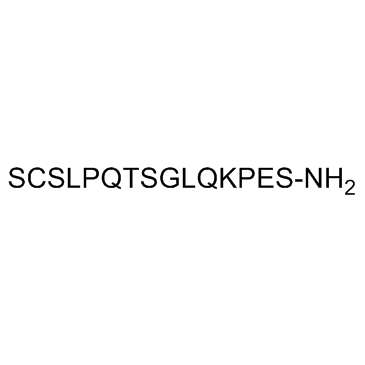258276-95-8
| Name | Leptin Fragment 116-130 Amide mouse |
|---|---|
| Synonyms |
Obese Gene Peptide 116-130 Amide
LEP (116-130) (mouse) Leptin SER-CYS-SER-LEU-PRO-GLN-THR-SER-GLY-LEU-GLN-LYS-PRO-GLU-SER: SCSLPQTSGLQKPES LEPTIN (116-130) AMIDE SER-CYS-SER-LEU-PRO-GLN-THR-SER-GLY-LEU-GLN-LYS-PRO-GLU-SER-NH2: SCSLPQTSGLQKPES-NH2 LEP(116-130)(mouse) |
| Description | LEP(116-130)(mouse) is a synthetic leptin peptide fragment. |
|---|---|
| Related Catalog | |
| In Vitro | LEP-(116-130) (300 µM) is unable to inhibit AP-OB binding[1]. |
| In Vivo | LEP-(116-130) (1 mg, i.p.) results in a reduced rate of body weight gain in the presence of increased food intake compared with vehicle-injcted control mice. LEP-(116-130) significantly reduces blood glucose levels by appr 100 mg/dL. Administration of LEP-(116-130) to wild-type (+/+) C57BLKS/J-m mice for 4 or 7 days has no effect on their ability to thermoregulate[1]. |
| Animal Admin | Blood is drawn from the tail vein of each mouse 2 h before the onset of the dark period at the beginning of the study (day 0) and after 2, 4, and 6 days of treatment with 1 mg/day i.p. LEP-(116-130). Blood glucose levels are determined with a Glucometer Elite blood glucose monitor. After 4 and 7 days of treatment with 1 mg/day i.p. LEP-(116-130), sensitivity to cold is examined by placing the mice without food or water in a cold room with an ambient temperature of 4°C. Body temperature is measured with a rectal probe every hour for 4 h. |
| References |
| Molecular Formula | C64H109N19O24S |
|---|---|
| Molecular Weight | 1560.73000 |
| Exact Mass | 1559.76000 |
| PSA | 748.38000 |
| Personal Protective Equipment | Eyeshields;Gloves;type N95 (US);type P1 (EN143) respirator filter |
|---|---|
| RIDADR | NONH for all modes of transport |
| WGK Germany | 3 |

